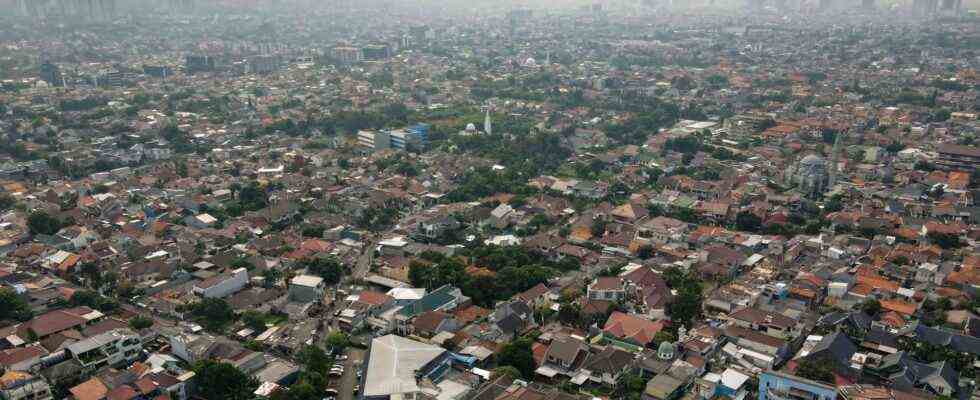Status: 16.09.2021 1:17 p.m.
Jakarta’s citizens are celebrating a groundbreaking verdict: A court has certified the Indonesian government to have neglected its responsibility for the extremely polluted air in the capital. Will that change now?
It is a historic decision, cheer the plaintiffs, setting the course for the notoriously polluted megamoloch Jakarta, as well as for all of Indonesia. In July 2019, a group of city residents and a number of non-governmental organizations went to court and asked the president, his government and the three provincial governors of the greater Jakarta area to get better air. So-called civil lawsuits, especially in environmental matters, are extremely rare in Indonesia.
The verdict was adjourned eight times, but the plaintiffs were ultimately successful: after more than two years, the judges have now ruled that the defendants at all levels of government have a responsibility for the quality of the air and that they have neglected it. In doing so, they would not have violated human rights. The governments are obliged to control the quality of the air, to ensure compliance with the prescribed guide values, to tighten the regulations and to punish violations of the environmental regulations.
The jubilation among the plaintiffs and environmental activists is great – now it has to be shown what concrete consequences the judgment will have.
Image: REUTERS
Pollutants from many sources
What sounds obvious is far from reality so far. Jakarta’s air is a nasty mixture of pollutants from many sources: there are eight coal-fired power plants and tons of industrial plants in the outskirts of the city, chronic traffic jams cause exhaust fumes from millions of cars and scooters, wild garbage incineration on the streets is omnipresent, and households and small industries use plastic and car tires and the like as fuel.
When cities around the world imposed curfews and lockdowns last year due to the corona pandemic, the air quality suddenly improved everywhere – only in Jakarta. A heavy blanket of toxic fumes remained over the city.
Empty streets during the lockdown – but the air quality hardly improved in Jakarta.
Image: AFP
“There is a lack of political will”
One of the 32 plaintiffs, Khalisah Khalid, has long suffered from the situation. Her ten-year-old daughter has had respiratory diseases and allergies since she was born. Khalisa attributes this to air pollution. For a good 15 years she and other activists had tried to get the authorities to act. “But to no avail. Our governments simply lack the political will to protect citizens from pollution,” she complains. “Every day the health threats to our children are increasing.”
At some point it was enough for her, and she and some fellow campaigners decided to sue the national and regional governments. They are not interested in compensation, emphasizes Khalisah. It’s just about making it clear that the government has an obligation to its citizens to ensure healthy air – and that it is not fulfilling this obligation.
Before the court, activists pointed out the consequences of massive air pollution – especially for children.
Image: AP
Pressure from the population is working
Ayu Eza Tiara is the plaintiffs’ attorney, and she believes the strategy is right: “When a topic gets public attention, gets into the media, the government can take action surprisingly quickly,” she explains. “The government didn’t respond to us until we filed the lawsuit.”
The environmental awareness in Indonesia is slowly becoming more pronounced, especially among the people in Jakarta, says Ayu. She thinks that constant pressure from the population will force those responsible to finally act. There are already the first signs of this, because since the filing of the lawsuit, some authorities have started to tighten regulations and enforce them more strictly. The verdict is a giant step forward, says Ayu, and not just for the capital of the 270 million country: “The laws that have been violated here are national law. The verdict is therefore important for all of Indonesia.”
Thousands of dead – every year
But the problems of the Jakarta metropolitan area, with its almost 30 million people, remain gigantic: At the beginning of May, a study by the British consultancy Verisk Maplecroft found that Jakarta was the most exposed of 576 cities worldwide to environmental factors. In addition to the threat of earthquakes and floods, the study named the “dire situation of air pollution”.
According to the UN, hundreds of thousands die in Indonesia every year as a result of the pollution, more than 7000 of them in Jakarta alone, according to Greenpeace Indonesia. In addition, there are chronic diseases and undesirable developments in newborns.
Government seat in the new test tube capital
Indonesian President Joko Widodo has a simple solution to Jakarta’s problems. One month after filing the lawsuit, he announced that the seat of government would be relocated: away from the polluted, submerged Jakarta, into a new test tube capital to be built on the comparatively green island of Borneo. He did not mention what should happen to Jakarta and its citizens in the meantime.
Khalisah Khalid and her comrades-in-arms can still not breathe a sigh of relief. But they still achieved a first, important victory.

